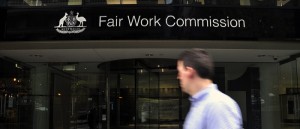The Enterprise Bargaining Process – a pathway to compliance

Many of my small to medium business clients balk at the idea of collective agreement making – having heard horror stories about the protracted negotiations that commonly occur between large companies and powerful unions. In most industries, employers with from approximately 10 to 40 employees often find the bargaining process extremely helpful in ensuring compliance, reducing payroll administration costs, and simplifying and adding a degree of certainty to the workplace conditions. Many find that the process itself is a great way to examine their operations as well as giving an opportunity to consult with and involve their team in the future of the organisation.
The steps are as follows:
Step 1 – is to meet with your legal team who specialise in agreement making. Before the bargaining phase commences it is crucial to outline your objectives, and employment lawyers with experience of drafting enterprise agreements every day have the capacity to frame the agreement directly towards your goals, while being confident with what can and will be approved by the Fair Work Commission. PCC Lawyers employ experienced hospitality consultants who are not only thoroughly acquainted with the modern awards, but are intimately familiar with the everyday concerns of businesses such as yours. Once your objectives are identified, your legal and consultancy team will identify other areas where wages can be saved, operations can be improved, and compliance can be assured. At the end of this process, your lawyers will have drafted an initial agreement.
Step 2 – Through this stage, it is important to identify which members of staff should be approached by you and encouraged to be the employees bargaining representatives. Most businesses have a small, but strong, employee core. These employees are those that you trust, but most importantly that are trusted by their colleagues. Identifying and approaching these individuals is key.
Step 3 – A notice of representational rights is distributed to the employees. This will be drafted according to the standard form by your lawyers. This must be given to all employees that are proposed to be covered by the agreement. It outlines their rights in terms of representation. We recommend that at the same time a letter to the employees from you, but drafted by your lawyers, can be written outlining what the key proposed changes are, their reasons, and their probable effects.
Step 4 – The employee bargaining representatives may wish to schedule a meetings or meetings to talk about the agreement. Your complete cooperation at this stage is important.
Step 5 – Any time 21 days after the notice of representational rights is distributed, you may ask the employees to vote on the agreement. A simple majority is enough. The timing of the process is important strategically. Many businesses have quiet times of the year that they operate on little more than core staff. You may wish to begin the process 3-4 weeks before you know that this will be the case.
 Step 6 – After agreement is reached, final document can be lodged with the Fair Work Commission for approval. A short hearing will take place with a commissioner, normally via teleconference, to assess whether the agreement passes the BOOT test. This is where the presence of your specialist workplace lawyers is essential, in helping to smooth out any edges of your agreement which may be contentious as far as the Commissioner is concerned.
Step 6 – After agreement is reached, final document can be lodged with the Fair Work Commission for approval. A short hearing will take place with a commissioner, normally via teleconference, to assess whether the agreement passes the BOOT test. This is where the presence of your specialist workplace lawyers is essential, in helping to smooth out any edges of your agreement which may be contentious as far as the Commissioner is concerned.
Step 7 – Once approved, your agreement is valid for three years, and remains valid for a further year after expiration. Once your employees and you enjoy the benefits of Enterprise Bargaining once, renegotiating the agreement in 3-4 years’ time is much easier.
A decade ago, agreement making under Work Choices was widely seen as a way to drive down the cost of staff. This is no longer a possibility. However agreement making is now the proactive operator’s means of taking control over employee relationships, and of reducing the cost and stresses of a complex national framework. For those operators that simply struggle to find or understand the award, Enterprise Agreements are a pathway to compliance.
This content is general in nature and provides a summary of the issues covered. It is not intended to be, nor should it be relied upon, as legal or professional advice for specific employment situations.

Pingback: Enterprise Agreements – Better Off Overall Test | Workplace Culture Matters